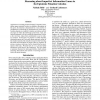Free Online Productivity Tools
i2Speak
i2Symbol
i2OCR
iTex2Img
iWeb2Print
iWeb2Shot
i2Type
iPdf2Split
iPdf2Merge
i2Bopomofo
i2Arabic
i2Style
i2Image
i2PDF
iLatex2Rtf
Sci2ools
AAAI
2010
2010
Reasoning about Imperfect Information Games in the Epistemic Situation Calculus
Approaches to reasoning about knowledge in imperfect information games typically involve an exhaustive description of the game, the dynamics characterized by a tree and the incompleteness in knowledge by information sets. Such specifications depend on a modeler's intuition, are tedious to draft and vague on where the knowledge comes from. Also, formalisms proposed so far are essentially propositional, which, at the very least, makes them cumbersome to use in realistic scenarios. In this paper, we propose to model imperfect information games in a new multi-agent epistemic variant of the situation calculus. By using the concept of only-knowing, the beliefs and non-beliefs of players after any sequence of actions, sensing or otherwise, can be characterized as entailments in this logic. We show how de re vs. de dicto belief distinctions come about in the framework. We also obtain a regression theorem for multi-agent beliefs, which reduces reasoning about beliefs after actions to reas...
AAAI 2010 | Imperfect Information Games | Intelligent Agents | Multi-agent Epistemic Variant | Reasoning |
| Added | 08 Nov 2010 |
| Updated | 08 Nov 2010 |
| Type | Conference |
| Year | 2010 |
| Where | AAAI |
| Authors | Vaishak Belle, Gerhard Lakemeyer |
Comments (0)

